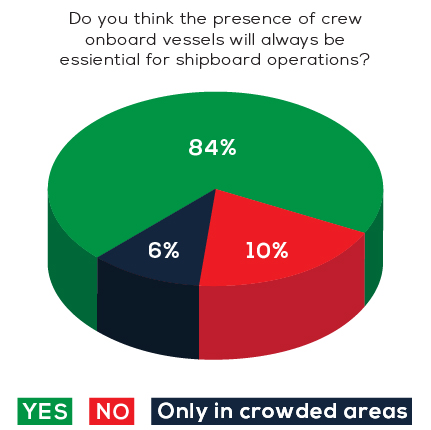Numerous statistics show that human error is the reason for the majority of maritime accidents, however, at the same time, many accidents have been avoided due to actions of the crew in difficult moments at sea. Thus, being in an industry that blames human error for the majority of maritime accidents while at the same time being in the verge of autonomous ships, we ran a quick poll to sense what people from the maritime world believe. Will the presence of crew onboard vessels be always essential for shipboard operations?
Although, shipping industry leaders expect oceans to be “flooded “with unmanned vessels and autonomous ships delivering cargo faster, cheaper and with zero-emission, shipping community’s perspective on this issue seems to be different.
[smlsubform prepend=”GET THE SAFETY4SEA IN YOUR INBOX!” showname=false emailtxt=”” emailholder=”Enter your email address” showsubmit=true submittxt=”Submit” jsthanks=false thankyou=”Thank you for subscribing to our mailing list”]
“Autonomous shipping is the future of the maritime industry. As disruptive as the smart phone, the smart ship will revolutionize the landscape of ship design and operations”, said Mikael Makinen, president of Rolls-Royce Marine earlier this year.
Remotely operated local vessels are expected to be broadly deployed by 2025 and ocean-going ships for maritime transport by 2035, however the industry in general hesitates to embrace this new trend.
Facts & Figures from SAFETY4SEA Poll
- 84%: crew onboard is crucial for the future
- 10%: crew onboard is unessential
- 6%: crew onboard is essential only in crowded areas
Interestingly, only 10% find the presence of crew onboard vessels inessential, and just 6% find it optional; believing that it is important, however, only when in crowded areas. The results of the poll reflect industry’s perception regarding autonomous revolution in maritime while, at the same time, questions are being posed with respect to the safety of life, assets and environment and whether they are adequately addressed prior the transition into the autonomous era.
Last month IMarEST issued a survey on a number of issues surrounding the adoption of remote and autonomous technology in shipping. The report showed that the adoption will proceed on a sector by sector basis, but it is still unclear as to the justifications for the business case for each of these sectors in terms of full adoption. Specifically, 85% of those surveyed agreed that seafarer skills will remain an essential component in the long-term future of the shipping sector.
The challenges ahead
Another SAFETY4SEA poll, earlier this year, revealed that the majority (71%) believe that seafarers will not be able to trust an autonomous system. Additionally, SAFETY4SEA Sea Sense column – in association with the North P&I Club – asked global experts to provide their perspectives on whether seafarers will be able to trust an autonomous system which were positive in general.
Certainly, lack of autonomous shipping knowledge and unforeseen interdependencies may bring challenges with respect to the system design, operation complexity, and environment. Cyber-attacks, connectivity or autonomy assisted accidents are among the challenges as well.
Therefore, for unmanned vessels to become a reality, regulatory framework must be in place. Requirements concerning the person having command of a vessel, sufficient manning, training and proper lookout must be considered in international conventions (SOLAS, STCW, COLREG).
At the meeting of IMO’s Maritime Safety Committee (MSC99), held in London from May 16-25, a framework for analyzing applicable IMO regulations was developed to shed light on the possible gaps between current regulations and the technological development.
Until the next meeting of the committee in December this year, this framework will be tested on a select few rules under the supervision of the Finnish delegation.
The Comité Maritime International (CMI) is also considering this issue through an International Working Group.
IMO Secretary-General Kitack Lim
We should keep in mind the role of the human element and the need to maintain safe navigation, further reducing the number of marine casualties and incidents.
Digital technologies are changing the landscape of shipping industry. In this age of connected ships; the industry could benefit from the advantages of e-navigation; however, it needs to further control the safety risks.































































